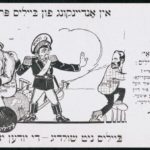In memory of the Beilis Trial: “Beilis Not Guilty, Jews Guilty” (circa 1913). From YIVO Collections.
The dramatic postcard above is a commentary on the notorious 1911 Beilis Trial, which escalated the already rampant anti-Semitic sentiment in tsarist Russia. In a case strikingly similar to the that of the Trial of Trent almost 400 years earlier, it revolved around blood libel.
Menahem Mendel Beilis, a Ukrainian Jewish brick-factory worker, was accused of blood libel after the dead and mutilated body of a 13-year-old Ukrainian boy named Andrei Yushchinsky was discovered near the factory. A lamplighter testified that he had witnessed Beilis kidnapping Yushchinsky near the factory, and Beilis was arrested on July 21, 1911.
In the words of the Jewish Virtual Library, despite clear evidence that a criminal gang had committed the murder,
the reactionary antisemitic organizations led by the “Black Hundred” [the reactionary *Union of Russian People"] pressured the antisemitic minister of justice, I.G. Shcheglovitov, to conduct the investigation of the crime as a ritual murder. Accordingly, the chief district attorney of Kiev disregarded the police information and instead looked for a Jew on whom to blame the crime, through whom the entire Jewish people could be publicly indicted.
While Beilis languished in prison for two years waiting for a trial, newspapers circulated the story throughout the Russian Empire, which led to anti-Semitic campaigns against many Jewish communities. Many Russians then believed that Jewish people engaged in ritual murder of Christians, a slander upheld by the Catholic priest and self-proclaimed “Talmudic expert” Justinas Pranaitis during Beilis’s 1913 trial.
The case against Beilis fell apart when the lamplighter confessed to having been intimidated by police officers, and when it became apparent that Pranaitis knew little about the Talmud. Beilis was acquitted, and eventually immigrated to America. Particularly in the United States, critics censured the sham trial for its anti-Semitic motives, masked as a search for the boy’s murder.
The creator of the postcard above seems to be similarly angered. The image depicts the tsar letting Beilis go free, while at the same time restraining a man labeled “the Jewish people” with a ball and chain of “blood libel.” The Tsar is telling Beilis, “Go, Mendel. You’re free! Rejoice with your American friends but I won’t waste any time in getting even for your acquittal with your left-behind Russian brothers.”

